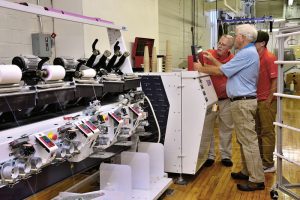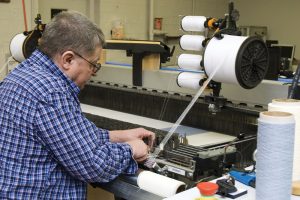
Textile Technology Center at Gaston College — a well-kept secret few have heard of — is a non-profit entity focused on technical support for the textile industry.
By Jim Kaufmann, Contributing Editor
Most dictionaries define evolution as “the change in characteristics of a species over several generations.” Change the word species to organization in that definition and it describes how the Textile Technology Center (TTC) at Gaston College, Belmont, N.C., has managed to service the textile industry for 77 years and is still going strong. Originally established as the North Carolina Vocational Textile School, the organization began offering classes in 1943, roughly midway through the southern U.S. textile industry’s boom years. Fueled by increasing demand for textiles throughout the World War II and Korean war eras, then later to clothe baby boomers through the 60s and 70s, the industry expanded. And so did the vocational school as it trained and educated people in textiles to support that burgeoning growth.
New technology developments led to more diverse applications for textiles beyond clothing and bedding, and further industry expansion enhanced TTC’s offerings. Then came the transitional years of the 1980s and 1990s when drastic shifts occurred in the industry — a result of breaking up several larger textile companies by venture capitalists as well as moving a high percentage of textile production to low cost producers in the Far East. The introduction of the North American Free Trade Agreement (NAFTA) and persistent downsizing of the U.S. textile industry that continued into the 2000s led most people to conclude that the industry was dead. Yet, to borrow a famous quote, “reports of the textile industry’s death were greatly exaggerated.”
Enter present day, and: “Though many still think of the U.S. textile industry as being dead, we see it much differently,” said Sam Buff, TTC director. “We’ve managed to evolve with the highs and lows of the textile industry over the years. In the early years, TTC was a little standalone community college teaching textiles and adding additional programs and services along the way. Then the industry started moving off-shore, NAFTA was created and business in this region changed drastically because textiles were no longer prominent.”
Buff noted that from 1999 until 2005, TTC spent time trying to figure out what it could do and where it might create value. “During the lean years, we still did some training, but also started assisting companies to succeed within the changing textiles environment by offering outsourced R&D and testing services. In 2005, we were absorbed into Gaston College and rebranded as the Textile Technology Center.”
As part of Gaston College, TTC is strictly a non-profit entity with four primary areas of technical support including sample production, product testing, problem solving and customized training. “Our prices are reasonable because we are non-profit and not driven by any type of share-holder expectations,” Buff said. “Roughly 70 percent of our income is generated by sales, while the remainder comes largely from the state.”
TTC’s customers include everything from entrepreneurs to multi-national corporations and it currently has approximately 600 active customers from across the globe. Projects have come from 35 different states and countries including Germany, Brazil, Australia, Israel, Portugal, Honduras and Mexico.
“We’ve pretty much come full circle with the increased demand for improved textile education and training as the industry comes back and continues to diversify into more exotic areas,” Buff offered. “We do sense a change in the industry with reshoring. People are investing in textiles in the United States again and TTC is benefiting from that. There are many diverse pockets of not just fashion inspired textiles, but also industrial, performance and technical textiles that continue to evolve creating so much more to this industry than just those old perceptions. Textiles have evolved and expanded and continue to do so and we need to continue evolving and adapting quickly as well to meet the industry’s needs before someone else does.”
Over the past several years, Buff and TTC have reassessed its strengths, weaknesses and capabilities to more clearly define what TTC essentially is today — a one stop shop for textile product and process development needs. Businesses, entrepreneurs and others now use TTC as a research and development (R&D) resource to help reduce internal development costs. As a result, TTC customers do not have to invest in a fully capable testing lab, R&D equipment, facilities, or — more importantly — the talent required to operate those areas.

It’s Really About The People
“The real key is people and we certainly have some good ones here,” Buff exclaimed. “We have a good mix of the grey hairs, young kids and the in-betweens. It’s great to see how their different perspectives work together to help each other out and solve the problems at hand. Our older folks love to help, mentor and educate the younger ones. And that’s not always one sided either — the younger ones also tend to bring a new-age perspective to the issue at hand that often will cause the older folks to stop and rethink things in a different light.”
Talented staff is one of Buff’s biggest concerns when it comes to TTC’s and possibly the textile industry’s future sustainability. “Talent that understands textiles and soft goods is really difficult to find,” Buff lamented. “It’s tough to replace someone with 45 years of experience! You can teach new people to run a machine, but it takes years to teach them how to make fabric. It’s hard to beat that high level of experience that only comes from years of knowing what or where to make an adjustment, how to compensate for material variations or when the machine just happens to be having a bad day.
As experienced people reach retirement age, the smaller pool of talent to draw from is impacting the industry negatively, according to Buff. “I truly think the textile industry has done a poor job at developing people and that’s hurting us now,” he noted. “Look around, there used to be several textile schools feeding the industry, and now NC State might be the last one in the United States to offer a true textile curriculum. Because of this, TTC is striving to become a talent incubator by helping industry to hire people out of high school or elsewhere and then providing them with unique opportunities to work with our experienced staff who can mentor and pass along industry knowledge.”
Much of TTC’s staff comes from the textile industry and still maintains strong connections throughout the fiber, yarn and fabric manufacturing arenas as well as with different and related industries. Those staff connections help TTC grow its list of resources that includes people, technologies and general knowledge of how to get things done. “We really do know a lot of people,” Buff sad. “This industry at times can feel really big and spread out, but at other times it can be small and intimate. We do a lot of networking, sourcing, servicing and putting people together. For us, it’s all about helping everyone in this industry to succeed. We keep trying to get more people to see the textile industry for its opportunities and possibilities to help us build our connections and resources, which in turn helps our customers.”
While Gaston College does not have a specific textile curriculum to draw from, TTC maintains connections with other textile universities and related institutions in the area. “We’re a good team player!” Buff emphasized. “We do work with other universities where we can. We’re in constant contact with the Manufacturing Solutions Center (MSC) in Hickory, N.C., as well NC State in Raleigh, N.C. Also, there’s companies in the area like Southeast Nonwovens (SENW) and of course many others throughout the industry.”
Buff said TTC looks at the nature of the project along with the resources and technology it requires and then shares its customers either leading the charge or by assisting as appropriate. “MSC has better knitting capabilities, SENW has nonwovens covered, NCSU has its textiles curriculum and all their resources and we are strong in fiber, yarn and weaving — so there’s a good mix of talent and technologies to work with,” Buff noted.

Access To Technology Helps
TTC aims to be a great place for the industry to come play, and it makes every effort to be easy to work with. It does not ask for a position in any intellectual property. “We want to help you develop your product in the hope that you’ll come back again the next time,” Buff said. “Most do!”
Buff has been with TTC since 2005 serving as director since 2012. TTC does R&D, but it’s more like a small r and a big D, according to Buff. “I see research as the process of learning all you can about your idea, basically understanding everything you can no matter how big or small an idea it is,” Buff said. “That’s where a research university may be better than us. On the other hand, development is mostly about achieving commercialization. Your idea looks great on paper, now what? TTC excels at taking ideas to commercialization.”
TTC will take the idea and push it through its processing areas to determine if it can be run or not. Buff said the center maintains honesty with the customer throughout the process because if the idea will not run on its processing equipment, a manufacturer likely will not be interested in the product. “They want to know that your product can run, it’s ready to process and commercially viable,” Buff reported. “We get you to that point.”
TTC’s labs include fiber extrusion, yarn development, fabric formation — including weaving and knitting — and dyeing and finishing. It also has well-equipped physical testing and analytical labs to assess and validate products each step of the way. “We try to start with the fiber technology because that drives everything else downstream,” Buff said. “The black magic and pixy dust found in fiber and yarn technology these days is where much of the real value originates and we’ve been working to upgrade these areas at TTC to be more in line with industry technologies. We’ve also found the industry is realizing this value and is willing to invest in TTC, which helps them, and our customers, in the long run.”
Current upgrades include new Murata Vortex spinning technology with additional upgrades planned in the near future. The upgrades also will help TTC with product scalability, which has on occasion been a challenge.
“Sometimes customers come in with literally a handful of fiber and ask us if we can make a fabric out of it?” Buff said. “The answer is usually yes, by the way. Then we have the ‘tweeners’ who want to produce, test and validate a concept which we can certainly help with. But occasionally, there are clients who we just cannot accommodate because the sample size was too big for us, even though it was too small for them to produce in-house. We’re hoping that the planned equipment upgrade efforts will position TTC better to assist with these types of projects.”

TTC Will Continue To Evolve
While TTC is a “great place for the industry to come and play,” it plans to continue to evolve and adapt to the textile industry’s needs. “Part of our challenge now, is in identifying what areas we should be going after as textiles continue to expand into other areas,” Buff offered. “We’re investigating composites, medical, recycling and renewable technologies and other areas. There’s just all kinds of untapped opportunities for textile technology and we need to be ready to support whatever the future brings our way.”
Buff also pointed out that the textile industry still has an image problem that TTC is fighting to overcome. “We need to keep attracting and developing strong minds to merge the old and new as new technologies and applications keep pushing us forward,” Buff said. “We attend tradeshows and conferences where we can conduct demonstrations, speak or even create complete programs on textiles. Gaston College has also recently hired a new marketing person who we plan to work with to get TTC more visibility.”
Throughout its 77 years of existence, TTC has adapted to a fickle industry’s needs and there’s every indication that it will continue to do so. Not bad for a “well-kept secret few have ever heard of.”
March/April 2020




